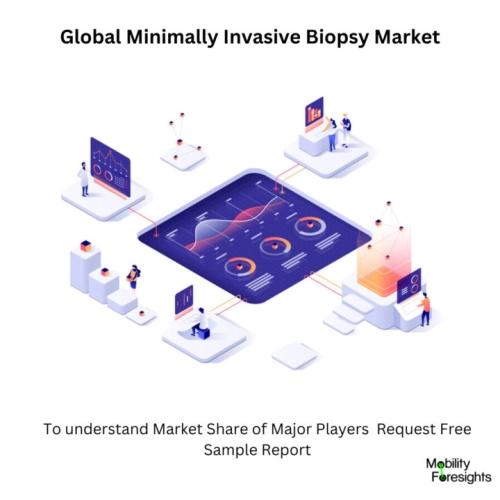
- Get in Touch with Us

Last Updated: Apr 25, 2025 | Study Period: 2024-2030
A minimally invasive breast biopsy technique (MIBT) is a procedure in which a doctor collects a sample of tissue using one of the following methods:To extract cells, fine needles are used.Hollow core needles are used to acquire tissue samples.Biopsy devices that use vacuum and cutting devices to extract tissue samples.
The most common varieties are: incisional biopsy, which removes simply a sample of tissue, excisional biopsy, which removes a complete lump or questionable area, and needle biopsy, which removes a sample of tissue or fluid with a needle.
Biopsies vary widely depending on how difficult it is to acquire the tissue. This is referred to in medicine as "invasiveness."
Most skin biopsies, for example, can be performed at the doctor's office during the same visit that the lesion is identified.Less discomfort, a shorter hospital stay, and fewer problems are connected with minimally invasive surgery.
One of the first types of minimally invasive surgery was laparoscopy, which involved performing surgery through one or more small incisions while using small tubes, tiny cameras, and surgical instruments.

The Global Minimally invasive biopsy market accounted for $XX Billion in 2022 and is anticipated to reach $XX Billion by 2030, registering a CAGR of XX% from 2024 to 2030.
Labcorp Plasma Focus Liquid Biopsy Test.Labcorp, a prominent global life sciences business, has introduced Labcorp Plasma Focus, a novel liquid biopsy test that allows patients with advanced or metastatic solid tumours to select tailored therapy.
The test enables treating oncologists to assess circulating cell-free DNA (cfDNA) secreted by tumour cells and better manage their patients' treatment through a personalised, targeted therapy plan.
Liquid biopsy tests give quick findings, give more people access to precision treatment, and just call for a routine blood sample.
An analytical validation study that Labcorp released in support of the release of Labcorp Plasma Focus shows that the test is a highly precise, sensitive, and focused method for genomic profiling.
To improve survival rates and lower disease-related expenses, doctors may now more easily and rapidly discover biomarkers for which tailored medicines are accessible thanks to Labcorp Plasma Focus.
Important genetic alterations may be found by sequencing cfDNA to help patients with non-small cell lung, colorectal, breast, esophageal, gastroesophageal junction, gastric, and melanoma malignancies choose the best therapy.
Together, these malignancies account for almost 800,000 newly diagnosed patients and result in more than 230,000 fatalities annually in the United States.
Tissue-based genetic testing is complemented by Labcorp Plasma Focus, particularly when tissue is not readily available or accessible.
This test demonstrates Labcorp's dedication to advancing patient access to precision oncology diagnostics and, most importantly, to driving scientific innovation.
| Sl no | Topic |
| 1 | Market Segmentation |
| 2 | Scope of the report |
| 3 | Abbreviations |
| 4 | Research Methodology |
| 5 | Executive Summary |
| 6 | Introduction |
| 7 | Insights from Industry stakeholders |
| 8 | Cost breakdown of Product by sub-components and average profit margin |
| 9 | Disruptive innovation in the Industry |
| 10 | Technology trends in the Industry |
| 11 | Consumer trends in the industry |
| 12 | Recent Production Milestones |
| 13 | Component Manufacturing in US, EU and China |
| 14 | COVID-19 impact on overall market |
| 15 | COVID-19 impact on Production of components |
| 16 | COVID-19 impact on Point of sale |
| 17 | Market Segmentation, Dynamics and Forecast by Geography, 2024-2030 |
| 18 | Market Segmentation, Dynamics and Forecast by Product Type, 2024-2030 |
| 19 | Market Segmentation, Dynamics and Forecast by Application, 2024-2030 |
| 20 | Market Segmentation, Dynamics and Forecast by End use, 2024-2030 |
| 21 | Product installation rate by OEM, 2023 |
| 22 | Incline/Decline in Average B-2-B selling price in past 5 years |
| 23 | Competition from substitute products |
| 24 | Gross margin and average profitability of suppliers |
| 25 | New product development in past 12 months |
| 26 | M&A in past 12 months |
| 27 | Growth strategy of leading players |
| 28 | Market share of vendors, 2023 |
| 29 | Company Profiles |
| 30 | Unmet needs and opportunity for new suppliers |
| 31 | Conclusion |
| 32 | Appendix |